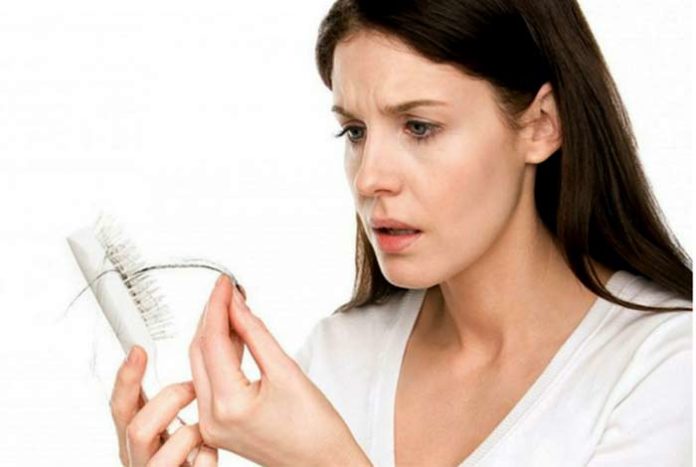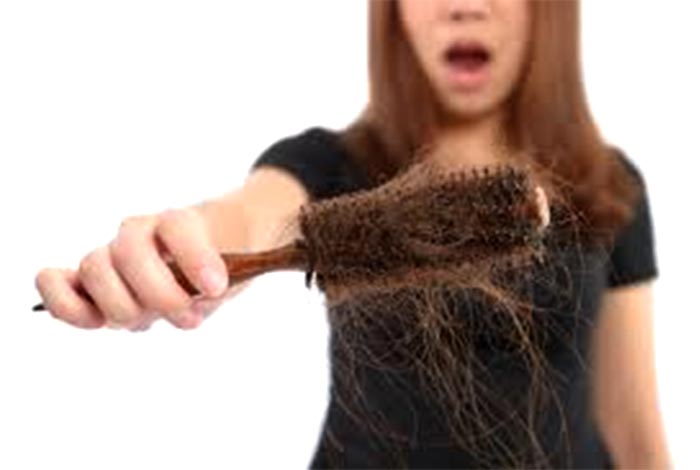
Does stress cause hair loss? Of course, it does. At least that is what research is pointing towards. The hair loss which happens as a result of emotional stress and physical stress has a name and is called ‘ Telogen effluvium’
Time and again we all experience stress in our lives. Most of us have highly demanding personal and professional commitments which add up the stress in our lives.
We all have a different reaction to stress and sometimes our reaction to stress are manifested in the form of physical changes like acne, hair loss and brittle nails.
Hair loss due to stress causes the hair follicles to enter the resting phase. This causes the hair to shed which leads to appearance of thinning. This thinning could be more prevalent in some areas of scalp as compared to others.
Dr. Julia Tzu, founder Wall street Dermatology, says that the cycle of hair follicle is divided into four stages- growing, transition, resting and falling out. Stress changes the amount of hair in the growth stage and transfers them in the resting or telogen state.
She further adds that the complex biology of the clockwork in the hair cycle cannot be understood. It is however realized that stress alters the clock and shifts hair in the telogen phase. But this may not be permanent, says Dr. Lauren Ploch, dermatologist at Georgia Dermatology and Skin care center.
Complete baldness may not occur unless the root cause is some other condition like alopecia areata [1] , which is an auto immune disease that causes extensive loss of hair in patches and gets aggravated with stress. You won’t see an episode of hair loss immediately after a stressful event. Telogen effluvium may be seen in the first three months after the experience. Generally, hair loss implies that new hair is growing at the base, so new growth can be seen approximately three to six months after the hair is lost.
When Should You Worry
An average person loses 50-100 hair in a day. [2] This is absolutely normal. And this is not even noticeable compared to the total number of hair on your head. But if you experience shedding excessively, then it is a problem.
Tzu says that if you noticed more hair strands coming off when you wash or comb your hair or if you notice reduction in thickness in a particular area of your scalp, you must see a doctor. It should not be alarming. You can lose hair when you get stressed out and hair growth is not a vital function.
During times of stress, the body enters the survival mode and thus directs the resources away from the non-essential functions like nail growth and hair growth.
There’s not much evidence regarding the fact that certain groups experience more stress related hair loss as compared to others. Tzu and Ploch added that new mothers experience more loss, considering the psychological stress that is accompanied with child birth.
Postpartum alopecia, a type of hair loss can happen because a sudden drop in levels of estrogen at the time of child birth [3]. This shift in hormones causes the hair to shout down for about four months but new moms can get the normal hair after about a year.
Further there is a mental health condition known as trichotillomania in which there is a compulsive urge to pull hair from various body parts and it is a result of high anxiety.

Ways to Stop the Shedding of Strands
Modifying your lifestyle can be helpful [4]. Apart from doing activities that you enjoy and getting enough sleep [5], you must get adequate amount of nutrients. Consume a well-balanced diet that is loaded with vitamins and minerals. You must be careful while taking biotin supplements as FDA released a memo in 2017 that biotin supplements can affect lab values.
Ploch says you should keep biotin intake to less than 35mcg a day. Biotin is a vitamin B that is helpful in fighting hair loss. It is found in foods such as milk, bananas and eggs.
It is not so important to treat hair loss as much as it is to find healthy ways to deal with the stress which causes the hair loss. To get rid of the anxiety, you need to exercise regularly, get adequate sleep, and have a healthy diet. Chocolates, hanging out with friends, and listening to music may reduce negativity. There are many more techniques which can help. If stress is hindering with your routine, you may need to discuss it with a mental health care provider.
Self-treatment may be an option for mild cases but you should consult a dermatologist immediately after you notice too much of shedding. You should not let it go untreated. If it is telogen effluvium, it will resolve on its own. But treatment must be sought if it is a more inflammatory or scarring hair loss.










